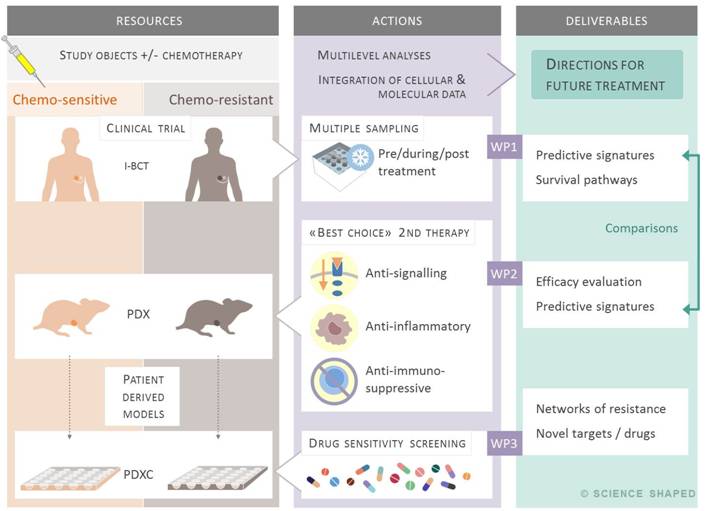Breast Cancer
TheraMetBC
Therapeutic Strategies in Metastatic and Resistant Breast Cancer
The project idea is based on the fact that a significant number of breast cancer patients will acquire resistance and progress into metastatic disease. The overall aim of the project is thus to improve future breast cancer treatment by categorizing patients having developed resistance against standard therapy into new treatment groups based on biological traits gained in the tumor during earlier lines of treatment. We have received funding from the Norwegian Cancer Society (2018-2021) and from the South-East Health Authorities (2022-2024) and our activities include clinical and experimental subprojects.
The specific goals are:
- Identify molecular signatures predicting response to therapy using longitudinal tumor samples from clinical studies .
- Identify novel targets to combat resistance by utilizing patient tumor tissue or resistant model systems (cell lines or patient-derived xenografts).
- Test the identified resistance mechanisms by intervening the corresponding pathways or microenvironmental interactions in patient-derived preclinical models.

RESCUER
RESistance Under Combinatorial Treatment in ER+ and ER- Breast Cancer
RESCUER is a H2020 funded project (PI: Prof Vessela Kristiansen) joining fifteen research groups from around the world. Through integration of multi-omics data with patient information from ongoing clinical trials, RESCUER seeks to identify the molecular characteristics separating non-responding vs. responding patients, and to suggest clinically effective personalized drug combinations for the non-responders.
We are responsible for testing promising drug combinations in PDX-models being resistant to the standard treatment regiments.
Collaborators in breast cancer related projects:
- Prof Vessela Kristiansen
- The RESCUER consortium
- Prof Kristine Kleivi Sahlberg, Vestre Viken Trust, and leader of the National Network for Breast Cancer Research
- The EurOPDX consortium
Improved treatment of HER2-positive breast cancer
PI: Kristine K. Sahlberg, Vestre Viken
Clinical response to HER2 targeted treatment varies and we seek to increase our understanding of HER2 positive breast cancers and their response to treatment. Using in vitro models we will investigate the miRNAs role to modulate the response to HER2-targeted therapy by sensitization screens with drug treatments. Furthermore, drug sensitization by in vitro screening will be studied in a medium-throughput fashion and tested in mice. By integrating molecular profiling data from multiple levels from the same patients in larger cohorts, we will be able to study the molecular mechanisms in HER2+ cancer in detail in a systems biology approach and investigate the clinical relevance of our findings from the in vitro models.
The main goals of this project are:
- Investigate whether miRNAs sensitize HER2 positive cells to HER2 targeted treatment.
- Search for drug combinations for treatment for HER2 positive cancers.
Read more about these projects at The National Network for Breast Cancer Research.
